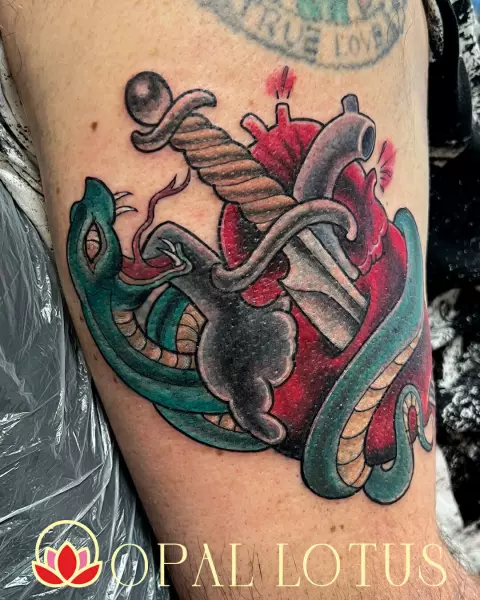When it comes to tattoo care, understanding the differences between freshwater and saltwater is crucial for maintaining the integrity of a new tattoo. Freshwater, which includes sources like lakes, rivers, and swimming pools, is generally less concentrated in minerals and salts compared to saltwater. This type of water can be soothing and refreshing, but it can also harbor bacteria and other microorganisms that may pose a risk to healing skin.
The lower salinity of freshwater means that it can be gentler on the skin, but it is not without its own set of challenges. On the other hand, saltwater, found in oceans and seas, contains a higher concentration of salt and minerals. This environment can be both beneficial and detrimental to a new tattoo.
The salt in seawater has natural antiseptic properties, which can help in preventing infections. However, the high salinity can also lead to dehydration of the skin, potentially causing irritation or fading of the tattoo ink. Understanding these differences is essential for anyone with a new tattoo who plans to engage in water activities.

Key Takeaways
- Freshwater exposure can lead to bacterial infections and fading of new tattoos, while saltwater exposure can cause irritation and fading as well.
- Exposing new tattoos to freshwater can increase the risk of infection due to the presence of bacteria and other microorganisms.
- Saltwater exposure can lead to irritation and potential infection of new tattoos, as well as fading and distortion of the design.
- To protect new tattoos from freshwater exposure, it is important to keep them covered and dry, and to avoid swimming or soaking in bodies of freshwater.
- To protect new tattoos from saltwater exposure, it is important to keep them covered and dry, and to avoid swimming or soaking in bodies of saltwater.
The potential risks of exposing new tattoos to freshwater
Exposing a new tattoo to freshwater can introduce several risks that may compromise its healing process. One of the primary concerns is the presence of bacteria and other pathogens that can thrive in lakes, rivers, and even swimming pools. These microorganisms can easily enter the skin through the open pores of a fresh tattoo, leading to infections that may require medical attention.
Infections can not only cause pain and discomfort but can also result in scarring or fading of the tattoo. Additionally, freshwater can affect the healing process by causing excessive moisture on the skin. When a new tattoo is submerged in water for extended periods, it can lead to maceration, where the skin becomes overly soft and breaks down.
This condition can hinder the natural healing process and may result in complications such as blistering or peeling. Therefore, it is essential to be cautious about exposing a new tattoo to freshwater environments until it has fully healed.
The potential risks of exposing new tattoos to saltwater
Saltwater presents its own unique set of challenges for new tattoos. While the saline content can have some antiseptic benefits, it can also lead to skin irritation and dehydration. When a fresh tattoo is exposed to saltwater, the high concentration of salt can draw moisture away from the skin, leading to dryness and potential cracking.
This dehydration can affect the vibrancy of the tattoo ink and may cause it to fade prematurely. Moreover, saltwater can exacerbate any existing irritation or sensitivity in the skin surrounding a new tattoo. The stinging sensation that often accompanies exposure to saltwater can be uncomfortable and may lead to further inflammation.
In some cases, individuals may experience allergic reactions or heightened sensitivity due to the salt content. Therefore, while enjoying a day at the beach may seem appealing, it is crucial to consider these risks before exposing a new tattoo to saltwater.

How to protect new tattoos from freshwater exposure
To safeguard a new tattoo from the potential risks associated with freshwater exposure, several precautions should be taken. First and foremost, it is advisable to avoid submerging the tattoo in any body of freshwater until it has fully healed. This includes avoiding activities such as swimming in lakes or rivers and even soaking in hot tubs or swimming pools.
If you must be near freshwater, consider using waterproof bandages or protective coverings designed specifically for tattoos. Another effective strategy is to keep the tattoo clean and dry after any accidental exposure to freshwater. Gently patting the area with a clean towel can help remove excess moisture without causing irritation.
Following this, applying a thin layer of fragrance-free moisturizer or healing ointment can help maintain hydration and protect the skin barrier. Regularly monitoring the tattoo for any signs of infection or unusual changes is also essential during the healing process.
How to protect new tattoos from saltwater exposure
Protecting a new tattoo from saltwater requires similar diligence as with freshwater but with additional considerations due to the unique properties of saltwater. The best approach is to avoid swimming in oceans or seas until the tattoo has completely healed. If you find yourself at the beach or near saltwater, consider wearing protective clothing that covers the tattooed area or using waterproof bandages designed for tattoos.
If accidental exposure occurs, rinse the tattoo gently with fresh water as soon as possible to remove any residual salt. After rinsing, pat the area dry with a clean towel and apply a suitable moisturizer or healing ointment to help combat any drying effects caused by the saltwater. Keeping an eye on the tattoo for signs of irritation or infection is crucial, as early detection can prevent more serious complications.
Tips for caring for new tattoos in both freshwater and saltwater environments

Caring for a new tattoo in both freshwater and saltwater environments requires a proactive approach to ensure proper healing. One of the most important tips is to keep the tattoo clean at all times. Use mild soap and lukewarm water to gently cleanse the area without scrubbing or using harsh chemicals that could irritate the skin.
After washing, always pat dry rather than rubbing, as this minimizes friction on sensitive skin. Hydration plays a vital role in maintaining healthy skin during the healing process. Applying a fragrance-free moisturizer regularly helps keep the skin supple and prevents excessive dryness or cracking.
Additionally, staying hydrated by drinking plenty of water supports overall skin health and aids in recovery. It’s also wise to avoid direct sunlight on a new tattoo, as UV rays can cause fading and damage during the healing phase.
Common misconceptions about tattoo care in different water environments
There are several misconceptions surrounding tattoo care when it comes to exposure to different water environments. One common belief is that saltwater is entirely beneficial for healing due to its antiseptic properties. While it does have some advantages, such as reducing bacterial growth, it can also lead to dehydration and irritation if not managed properly.
Many people mistakenly think that they can swim in oceans shortly after getting a tattoo without any consequences. Another misconception is that freshwater is always safe for new tattoos because it lacks salt content. However, as previously mentioned, freshwater can harbor bacteria that pose significant risks during the healing process.
Many individuals underestimate these risks and may not take necessary precautions when engaging in activities near lakes or rivers. Understanding these misconceptions is essential for anyone looking to care for their new tattoo effectively.

The importance of consulting with a professional tattoo artist for specific care instructions
Consulting with a professional tattoo artist is one of the best ways to ensure proper care for a new tattoo, especially regarding exposure to different water environments. Tattoo artists possess extensive knowledge about aftercare practices tailored specifically for their work. They can provide personalized advice based on factors such as skin type, location of the tattoo, and individual healing processes.
A professional artist will also be able to inform clients about their specific ink types and how they may react in various water conditions. This guidance is invaluable for preventing complications and ensuring that your tattoo heals beautifully over time. By following their recommendations closely, clients can enjoy their new body art while minimizing risks associated with water exposure during the critical healing phase.
FAQs
What is the difference between freshwater and saltwater exposure for new tattoos?
Freshwater exposure refers to exposure to water with low salt content, such as tap water or water from lakes and rivers. Saltwater exposure refers to exposure to water with high salt content, such as ocean water.
How can freshwater exposure affect a new tattoo?
Freshwater exposure can potentially introduce bacteria and other contaminants to a new tattoo, increasing the risk of infection and affecting the healing process.
How can saltwater exposure affect a new tattoo?
Saltwater exposure can cause irritation and discomfort to a new tattoo, as well as potentially slowing down the healing process. The high salt content can also cause the tattoo to fade more quickly.
How can individuals protect their new tattoos from freshwater exposure?
To protect new tattoos from freshwater exposure, individuals should avoid submerging the tattoo in water, especially in bodies of water with unknown cleanliness. It is important to keep the tattoo clean and dry during the initial healing period.
How can individuals protect their new tattoos from saltwater exposure?
To protect new tattoos from saltwater exposure, individuals should avoid swimming in the ocean or engaging in activities that involve prolonged exposure to saltwater until the tattoo is fully healed. If saltwater exposure is unavoidable, it is important to thoroughly rinse and clean the tattoo afterwards.
What are some general tips for protecting new tattoos from water exposure?
Some general tips for protecting new tattoos from water exposure include keeping the tattoo clean and dry, avoiding submerging the tattoo in water, and following the aftercare instructions provided by the tattoo artist. It is also important to avoid exposing the tattoo to direct sunlight and to use sunscreen if necessary.







